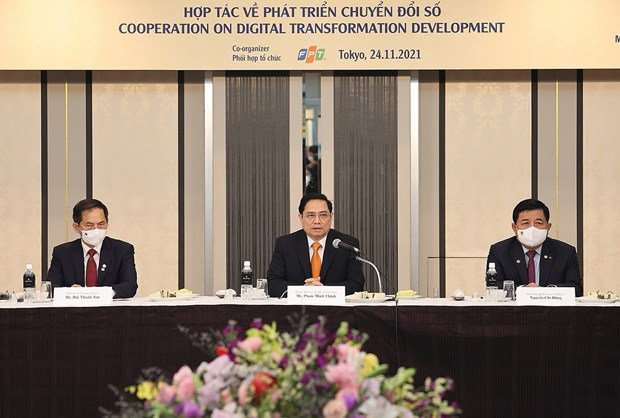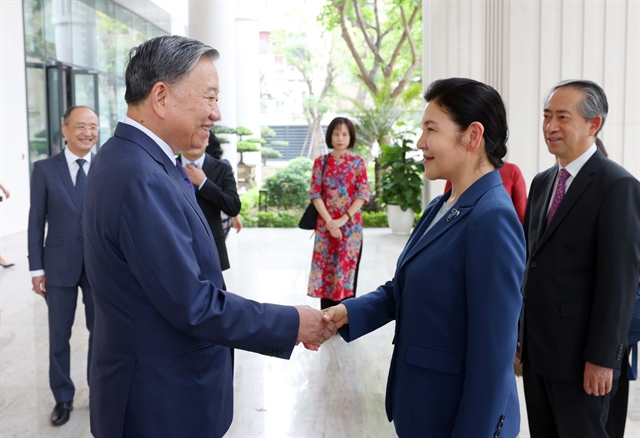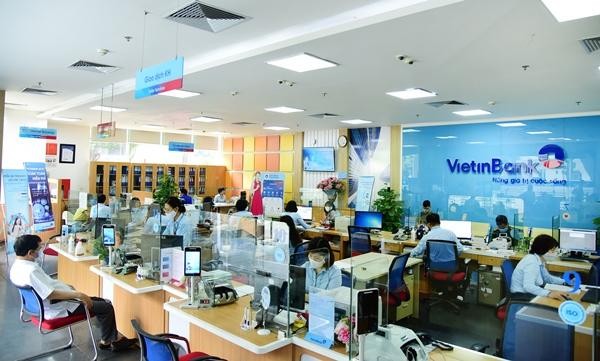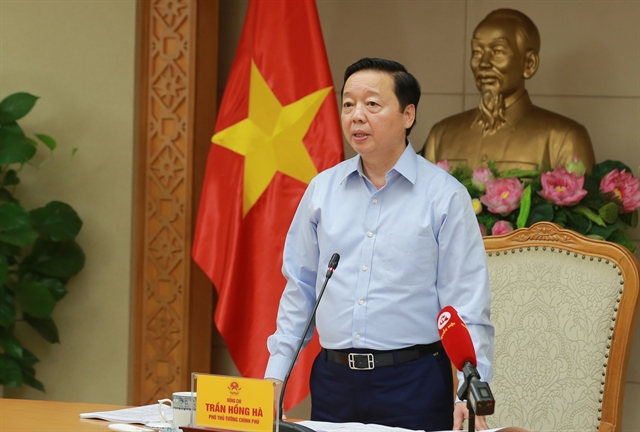 Politics & Laws
Politics & Laws


|
| Prime Minister Phạm Minh Chính at the meeting. VNA/VNS Photo Dương Giang |
HÀ NỘI — The Vietnamese Government will lead the way in digital transformation to mobilise public-private investment in this process, Prime Minister Phạm Minh Chính said.
He made the statement in Tokyo on Wednesday morning during his meeting with leaders of several major Japanese digital enterprises in his four-day official visit to the country.
Chính said Việt Nam has many advantages in economic development and digital transformation, notably a fast-growing and highly open economy, as demonstrated by the fact that Việt Nam has signed 17 free trade agreements with 60 economies, including major markets such as the US, the European Union (EU), Japan, China, South Korea, and the Association of Southeast Asian Nations (ASEAN).
Việt Nam's ability to adapt and embrace major development trends in the world, including digital technology and digital transformation, is very obvious, Chinh said.
Việt Nam has also adopted a national digital transformation programme to 2025, with the dual purpose of developing digital economy, digital society, and digital government, and establishing Vietnamese digital businesses with global capacity.
This programme is closely linked with other programmes on green growth and climate change and the Government targets to raise the share of the digital economy in GDP to 20 per cent by 2025 and 30 per cent by 2030.
Answering questions from businesses, Prime Minister Phạm Minh Chính said that Việt Nam will continue to perfect the digital transformation institutions based on practical demand.
Along with that, Việt Nam has a human resource training programme, first of all to raise awareness and promote people's knowledge about the importance of digital transformation.
“Digital transformation is not only guided by the Government but also includes the participation of people and businesses, as we’re putting people at the centre, and all policies must be directed towards the benefit of the people and businesses,” Chính said.
The Prime Minister also said that Việt Nam has been spending appropriate, effective and scientific financial resources for digital transformation; investing in technology, and improving national governance capacity.
He said Việt Nam's policy is to rapidly modernise the financial and banking sectors so that these fields can take the lead in digital transformation.
"Like other countries, Việt Nam has its own approach, suitable to its conditions and circumstances, but not separate from the general approach of the world, because only then can we cooperate with one another,” he said.
Speaking at the meeting, Deputy Minister of Information and Communications Nguyễn Huy Dũng added that the COVID-19 pandemic has strongly promoted digital transformation in Việt Nam.
In a period of 20 years, the proportion of people using online public services has only reached 12 per cent, but in just one quarter during the COVID-19 pandemic, this rate doubled to 24 per cent.
Now, 80 per cent of students in the country are studying online, higher than the average (more than 60 per cent) of the Organization for Economic Cooperation and Development (OECD).
The Government of Việt Nam has many policies to promote data development, achieving the goal of entering the top 50 countries with open data by 2025, and the top 30 by 2030.
Regarding human resources, Việt Nan currently has about one million workers in the information technology industry and in the 2025-2030 period, the country will need more than two million workers for this field.
Therefore, Việt Nam will implement training policies such as building majors in digital transformation, training online with higher quality and faster speed.
At the meeting, Minister of Planning and Investment Nguyễn Chí Dũng said that Việt Nam is implementing a programme to support businesses in digital transformation for the 2021-2025 period, according to which, by 2025, 100 per cent of enterprises are aware of the importance of digital transformation; and a minimum of 100,000 businesses receiving support from the programme.
Meeting with JICA President
On the same day, PM Chính hosted President of the Japan International Cooperation Agency (JICA) Kitaoka Shinichi.
The two sides noted with satisfaction that the Việt Nam-Japan extensive strategic partnership has been thriving across all fields, with a high level of political trust.
The Vietnamese Government leader highly valued the role and significant contributions of JICA in the implementation of official development assistance (ODA) projects in Việt Nam and the prompt provision of more than four million doses of COVID-19 vaccine and medical supplies from the Japanese government, which supports Việt Nam to roll out programmes improving its response capacity to the pandemic and healthcare services amid the complicated development of COVID-19.
PM Chính spoke highly of the recovery prospects of the Japanese economy, believing that the two nations need to cooperate more closely in the battle against COVID-19 and economic recovery and development.
Given that the Southeast Asian nation requires an enormous amount of capital for strategic infrastructure development, he called on Japan to provide new generation ODA funding for Việt Nam in a flexible manner, focusing on the six sectors of healthcare, reduction of greenhouse gas emissions and climate change adaptation, digital transformation, sustainable development, social welfare in relation to the negative impacts of COVID-19, and strategic infrastructure development.
Việt Nam will strive to raise the efficiency in the use of ODA, create favourable conditions for JICA experts to work in Việt Nam in the context of COVID-19, and minimise impacts on projects’ progress.
For his part, Kitaoka hailed the effectiveness of ODA projects in Việt Nam, adding that JICA will implemented a successful model to support the construction of large hospitals in Viet Nam over the years as an example, as well as build 100 others in various countries.
He pledged to further support Việt Nam in economic development, focusing on cooperation in healthcare, public investment and human resources development. VNS









